Rocket Languages

Summary
Rocket Languages is a comprehensive resource offering courses in several commonly learned languages. There’s a range of quality between the different language options. Some aren’t very good, some are worth looking at, but none of them are truly outstanding. While the material is often well-structured and full of practice opportunities, uninteresting content and repetitive exercises often keep the experience mediocre.
The platform is well designed and easy to use, but the content is often uninteresting.
There are lots of explanations and practice opportunities, but exercises are repetitive.
The price gives lifetime access to material and content.
I Like
- There are a lot of opportunities to speak
- Lesson materials are thorough
- Lots of practice opportunities
I Don’t Like
- Practice opportunities are repetitive and boring
- Speech recognition isn’t the best way to learn pronunciation
- The audio lessons can be uninspiring
Price
The price seems to change semi-regularly with frequent discounts. At the time of writing, they are:
$99.95 for Level 1
$249.90 for Level 1 and 2
$259.95 for Level 1, 2, and 3
In the world of online product reviews, anything goes. It’s often hard to know how accurate a review is — affiliate links with high commissions incentivize reviewers to say positive things about a product so that readers buy it and earn a commission for the reviewer.
Not all reviews are like this, of course. This website, for example, is an affiliate of many of the resources we review (this one included).
While we make money this way, we also make a point of eliminating as much bias as possible from our reviews. On a few occasions, we’ve been kicked out of affiliate programs for being unwilling to compromise on this.
Nevertheless, it’s something to look out for when reading a gushing and vague review of anything. Some language resources seem to attract more of these suspicious reviews than others, and Rocket Languages is one of them.
Rocket Languages has been around since 2004 and provides online language courses in several different popular languages. We’ve reviewed a bunch of them, and the quality varies by language.
Overall, the things that Rocket Languages seems to do well are developing a logical and thorough curriculum and providing ample practice opportunity. Reading, writing, and listening practice with native-speaker audio will get you a bunch of exposure to the language.
The areas in which Rocket Languages falls short are that the practice opportunities are very repetitive and the content itself is often fairly boring. It also doesn’t do a great job of teaching most languages with other writing systems.
The Rocket Languages Platform
The platform is pretty easy to use, and it’s one of Rocket Language’s strong points.
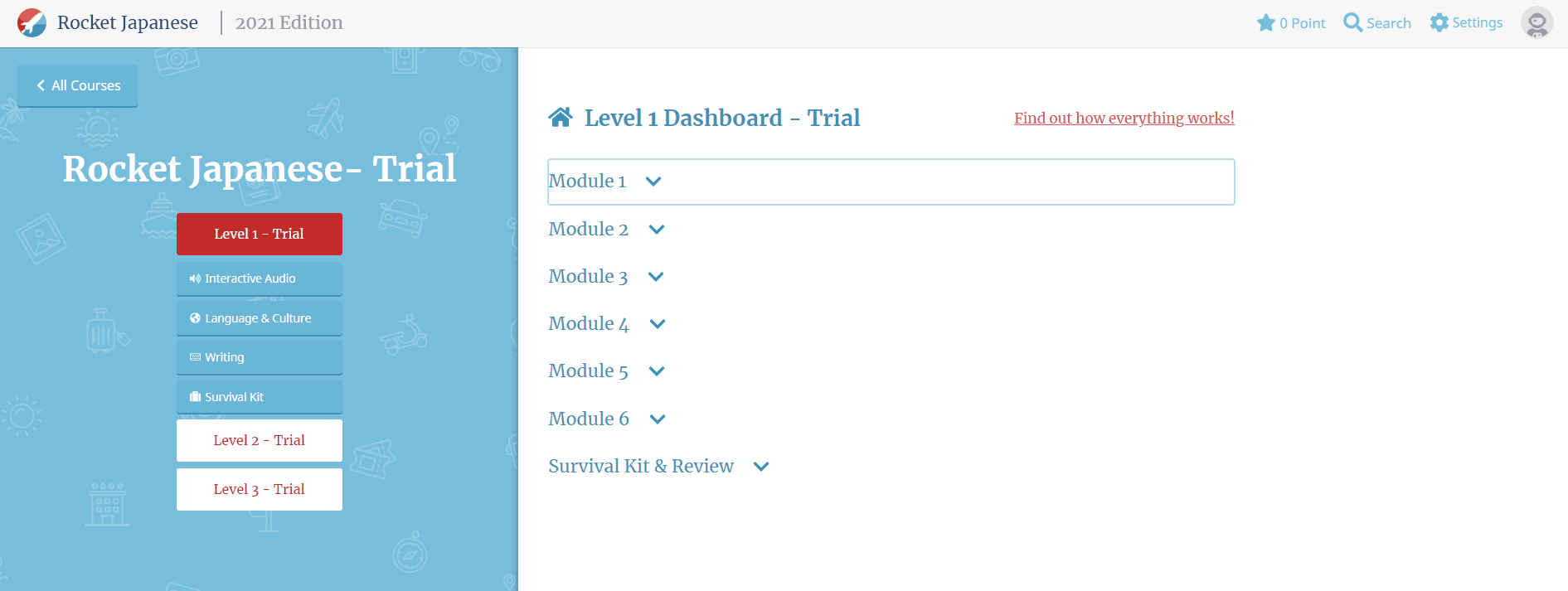
This is the dashboard view. From it, you can access all of the course materials as well as some additional language tools. You can also monitor your daily progress here.
Course Overview
Language courses on Rocket Languages are broken into three different levels by difficulty. These levels are then divided into modules, which are made up of lessons.
There are three different types of lessons in each module:
- Interactive Audio Lessons
- Language and Culture Lessons
- Survival Kit Lessons
There are also writing lessons for courses in languages with different writing systems.
Interactive Audio Lessons
Each audio lesson is centered around a piece of dialogue and resembles a podcast episode. The hosts will talk you through the dialogue and the different words in it on your first go-through.
You’ll also have chances during the audio lesson to pronounce the different vocabulary words and phrases individually.
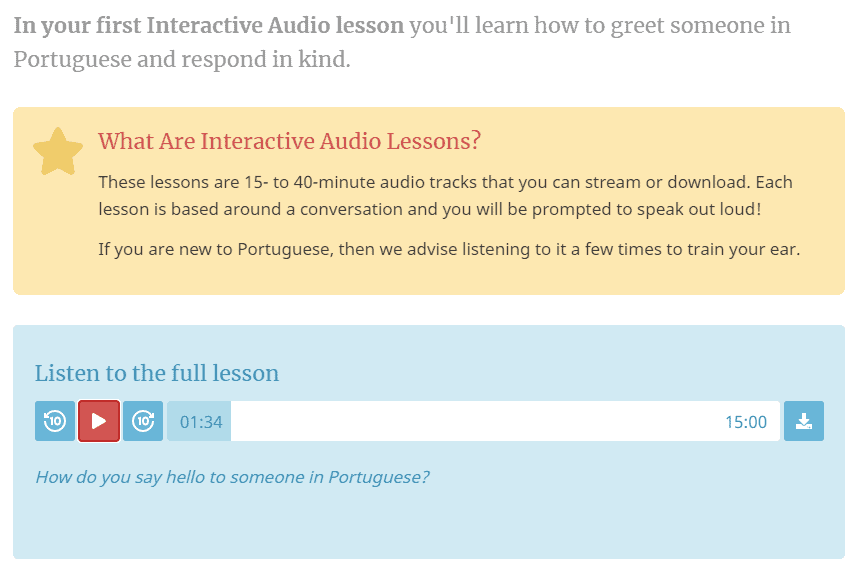
Each of these lessons is around 20-minutes long.
At the end of each audio lesson is the Rocket Review, where the hosts quiz you on what you learned in the lesson. For example, they’ll say a word in English and ask you to say the correct translation before playing the correct answer. This section is self-assessment only.
After listening to the audio lesson, you get to take part in the conversation practice activity. It’s called ‘Play It!’ and is essentially a role-playing activity — you choose one side of the conversation and “talk” with the other recorded half.
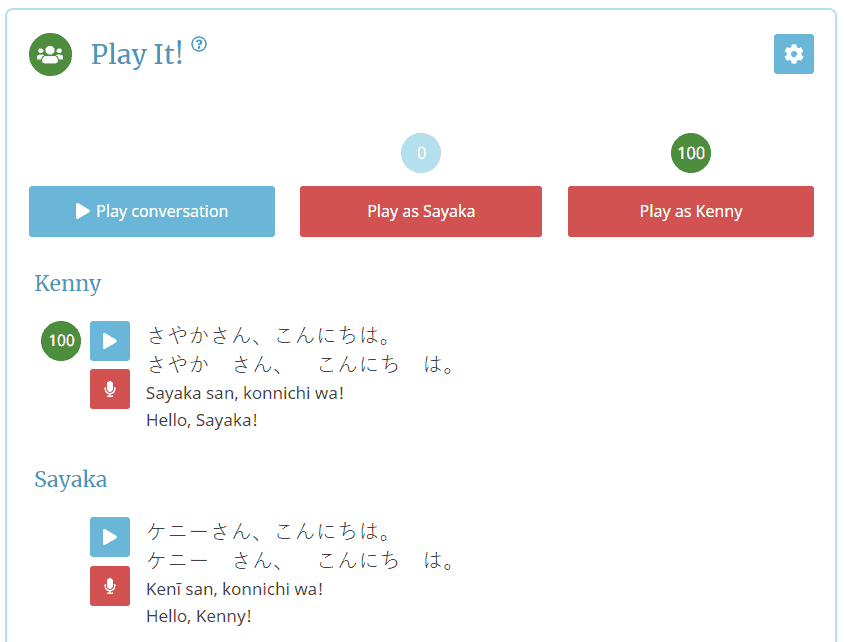
The platform uses speech-recognition technology to provide assessment for this activity. This kind of technology isn’t perfect by any means, and it does just an alright job of providing feedback in Rocket Languages.
You’ll almost certainly get at least some faulty feedback. Also, while the program does supply you with a transcription of what it recorded you saying, it isn’t the most accurate or efficient way to learn from your mistakes.
After this section, there’s a list of extra vocabulary words from the lesson, some extra audio recordings, and then the reinforcement activities, which we’ll talk about more later.
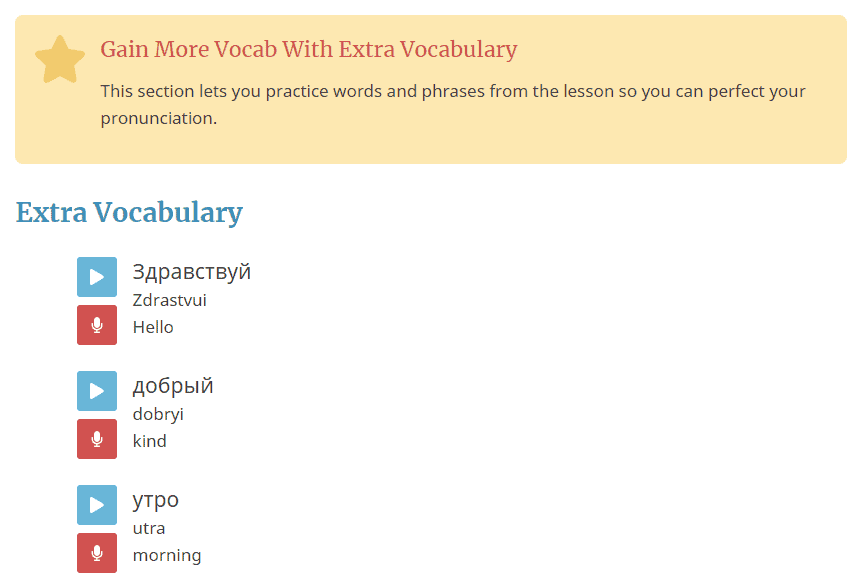
The extra vocabulary comes with a translation, an audio recording, and the chance to record yourself saying the word or phrase. This is pretty handy if you want to practice these items individually.
Language and Culture Lessons
These lessons contain a lot of useful information. This is where you’ll get in-depth grammar instruction and cultural notes that correspond to the level of the language you’re currently learning.
It’s a lot of text, which can get dreary, but the information is usually good. There are also several opportunities to listen to and try to produce the language throughout the lesson.
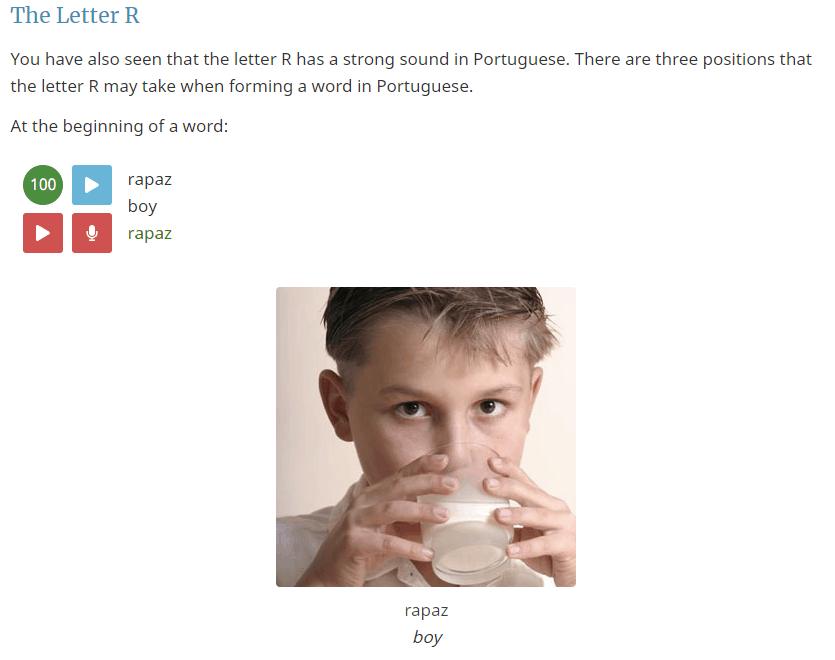
The fact that Rocket Languages offers this kind of in-depth explanation is great and makes it more thorough than some other resources, but that isn’t to say others don’t do it better.
The cultural aspects of these lessons are also quite useful. They usually relate to the material you’re learning and provide some extra value.
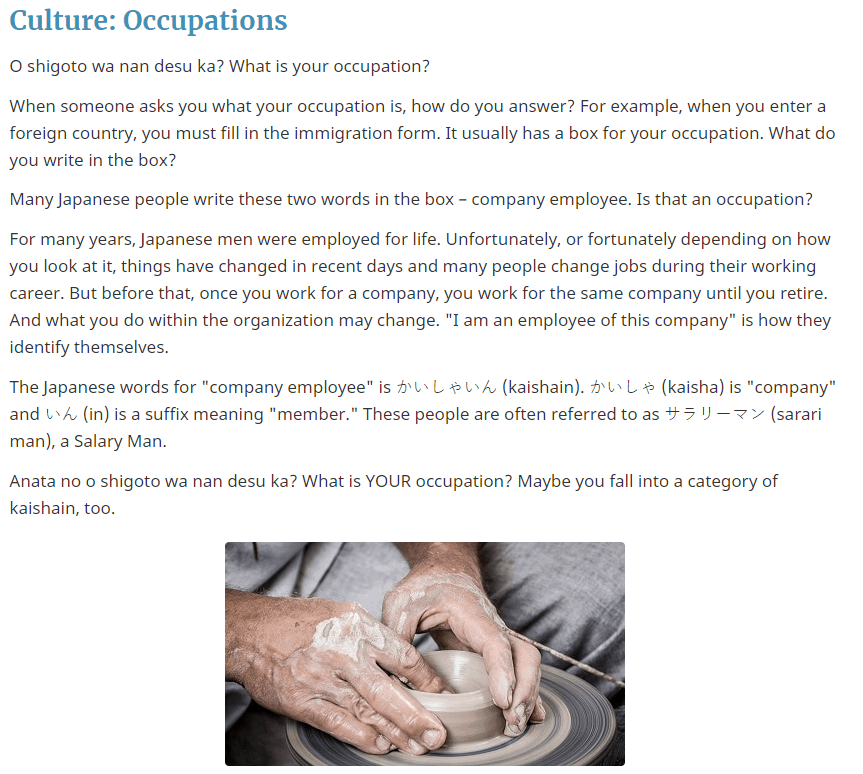
This snippet from a Japanese culture lesson gives some background information on working life in Japan.
Making connections with the culture of the language you’re learning is a great way to make your studies more meaningful and to deepen your understanding of the language.
At the end of these lessons, you’ll be able to practice and review all of the material using the Rocket Reinforcement Activities.
Survival Kit Lessons
These aren’t really lessons at all, to be fair. Instead, they’re just groups of related vocabulary words to learn. They also aren’t taught in any context, which isn’t a great way to learn new words.

These are some of the categories of words you can learn in the French course.
Vocabulary building is an important part of language acquisition, but this isn’t the best way to do it. If you’re just after building your vocabulary, you’d be better off using Anki or Memrise. If you want to learn words in a meaningful context, LingQ is a better option.
Writing Lessons
For languages that have a different writing system from English (Chinese, Hindi, Japanese, Korean, Arabic, Russian), there are also writing lessons. Some are better than others, but none of them are great at teaching writing.
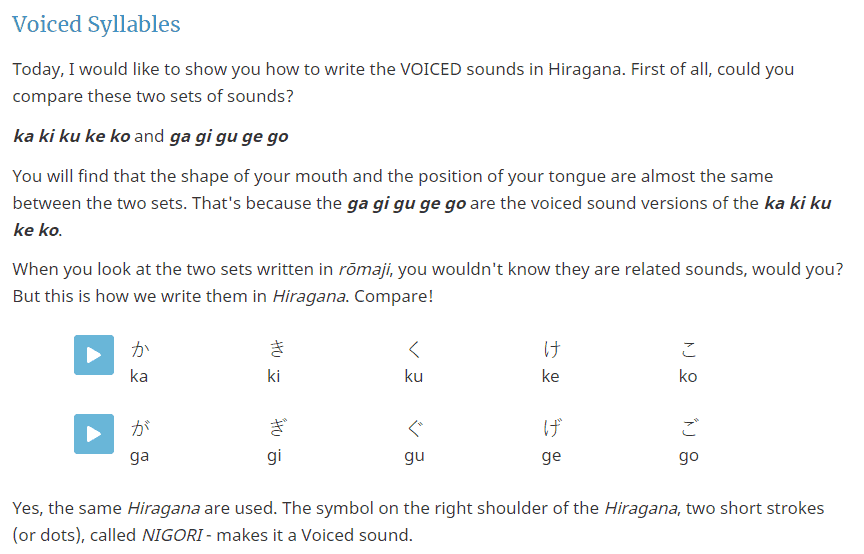
This is an example writing lesson from the Japanese course, which is one of the better ones for writing. Each of the writing lessons comes with lots of explanations, which is really nice, but the practice opportunities always feel insufficient.
Learning how to use a new writing system is an essential element in learning some languages, so it’s nice that Rocket Languages provides support for this. That said, there are certainly better ways to become comfortable with new writing systems.
For those interested in learning how to write Chinese and Japanese characters, Skritter is a better option and is worth considering.
Rocket Reinforcement Activities
These are activities that come with each and every lesson. Their aim is to provide you with more opportunities to practice the material you just learned in the lesson.
Practice is a necessary part of language learning, and these activities provide thorough practice. Unfortunately, their repetitiveness makes them quite boring after a short while.
Flashcards
This is the first activity you can use to reinforce what you learn, and I bet you can guess how it works. Here’s the second side of a flashcard from a Russian audio lesson.
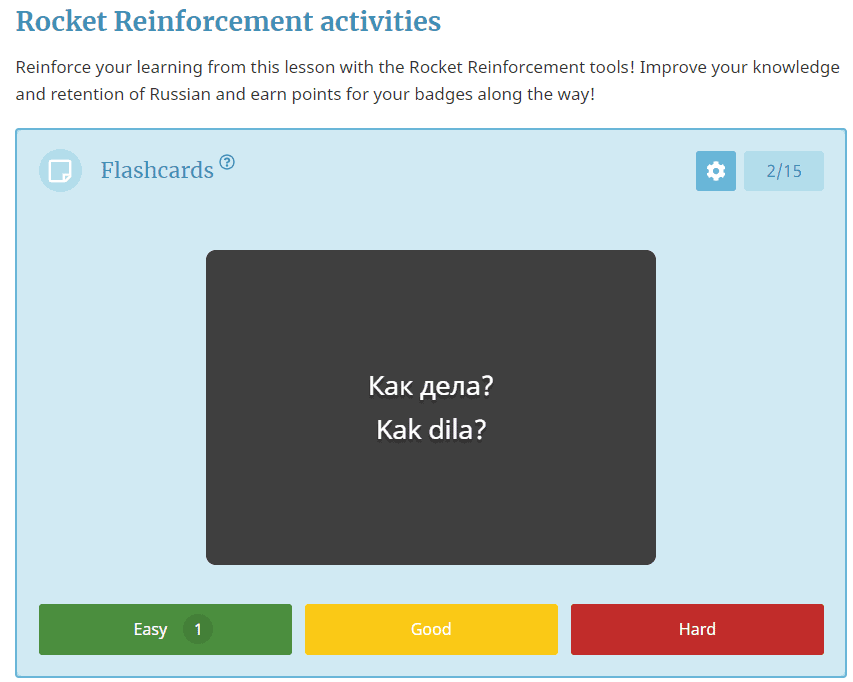
It’s very simple. The learner is supposed to say the Russian translation aloud and then click the ‘Flip’ button to see the correct answer.
Like in many resources, this flashcard activity asks users to self-assess. This isn’t the most dynamic way to review, but it’s a nice option to have.
This feature would be much more helpful if there was an option to practice vocabulary words from previous lessons. As it is, the flashcard activity only includes vocabulary from the current lesson.
Hear It! Say It!
The instructions for this one are in the name. This activity helps you practice your listening and pronunciation skills.
First, press the play button to hear an audio recording of a piece of vocabulary.
After listening to the word or phrase, it’s your turn to try and repeat the word while recording yourself. The speech-recognition technology will give you a pronunciation score out of 100 and reveal the language item.
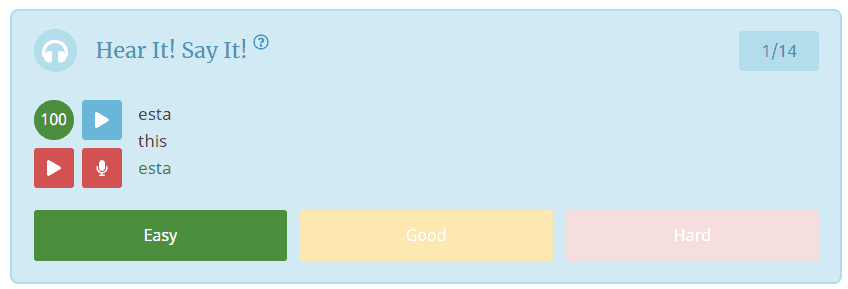
There isn’t much to say about this activity. It’s basic and, aside from the sometimes iffy voice-recognition, it works well. It does become quite boring, though.
Know It!
In this activity, the user is given an English word or phrase and asked to record themself saying the translation.
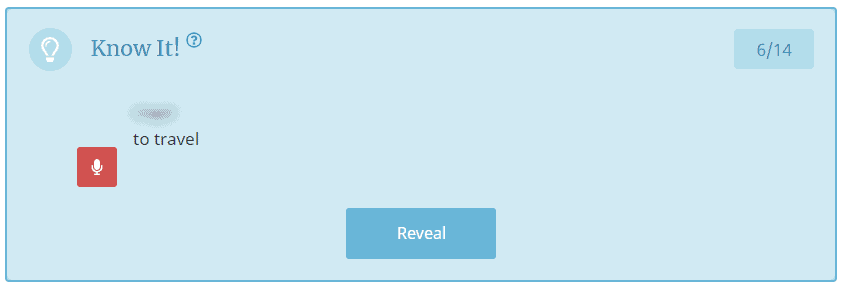
This activity is useful for practicing meaning and pronunciation. It’s very similar to the flashcard activity, with the addition of a graded pronunciation element.
Quiz
The quiz activity is a series of multiple-choice questions pertaining to the material in the audio lesson.

As well as vocabulary questions, you’ll get comprehension questions related to the conversation in the audio lesson. You can listen to the conversation in the target language as many times as you like by pressing the play button in this section.
Extra Testing
For languages with a non-Latin writing system, there are often extra practice activities that appear after the Rocket Reinforcement Activities.
Sort it!
These activities have users sort chunks of text into the correct order after listening to a word or phrase.
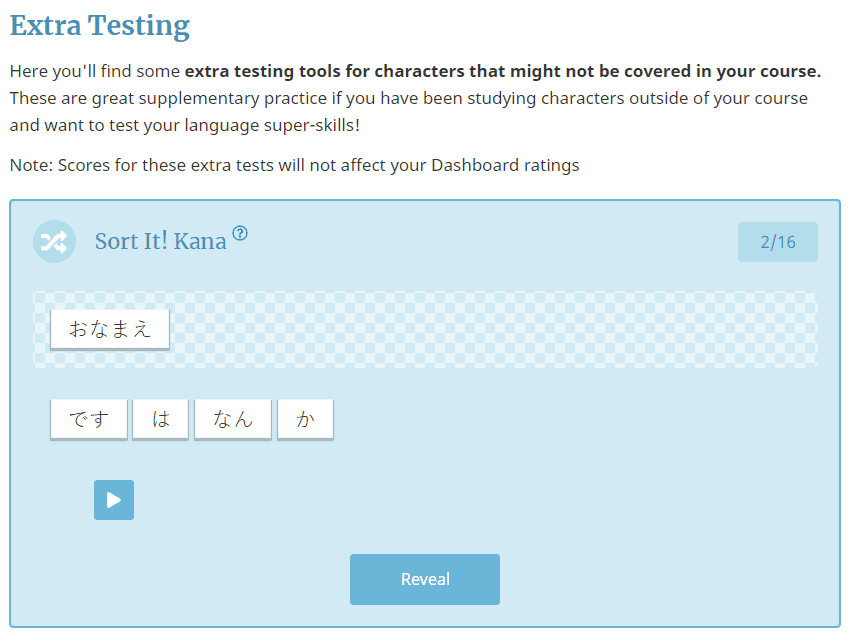
I think it’s nice that the platform offers this extra reading practice, but you’ll need to supplement your study plan with other resources if you really want to learn to read another script effectively.
The Travelogue
This is an extra feature on the Rocket Languages courses and is available for separate purchase. It is only available in the Russian, French, Italian, and Spanish courses.
These lessons are specifically designed for people that are planning on traveling to a foreign country as a tourist in the foreseeable future.
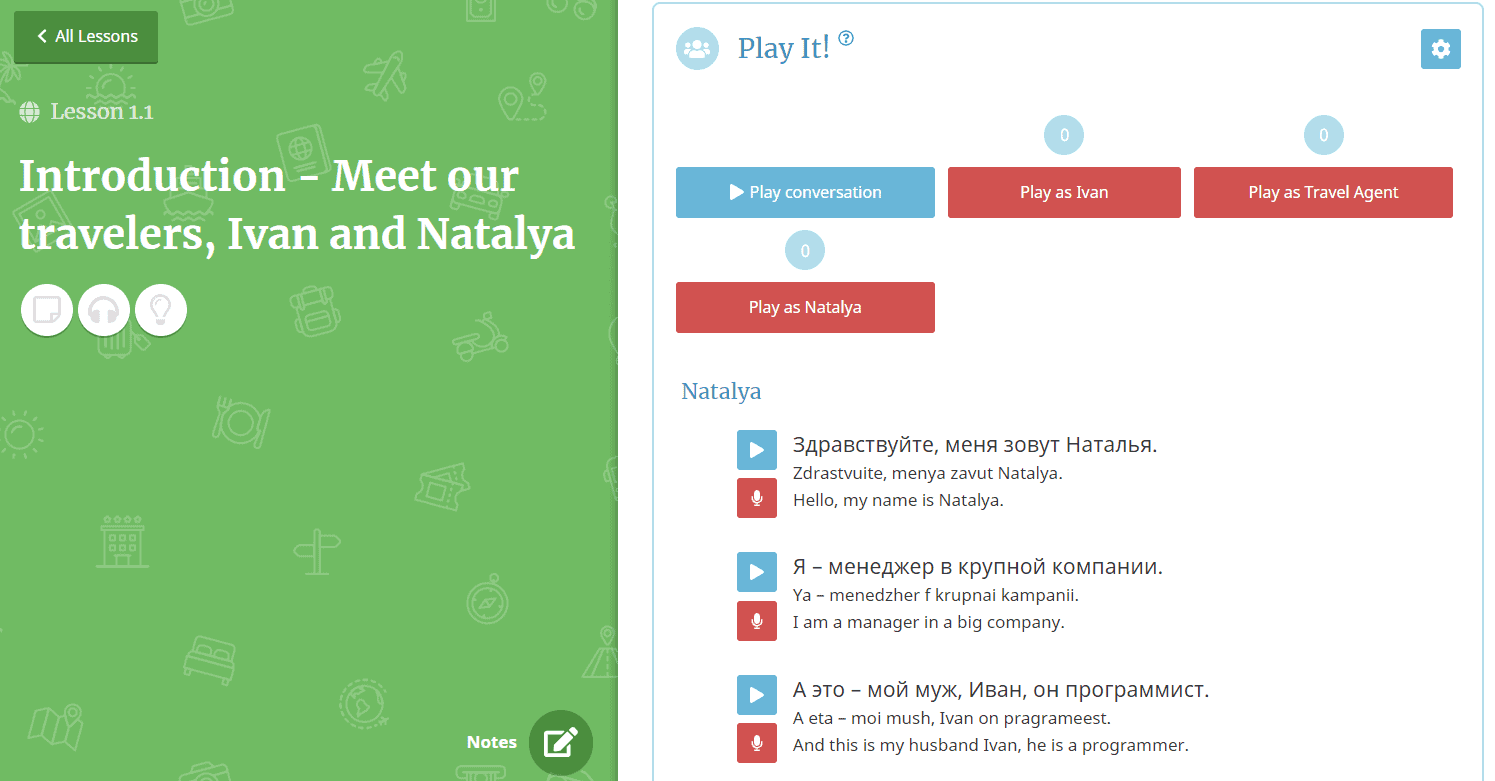
The Travelogue acts as an intensive crash course in language for tourism. In the Italian version, it follows a fictional couple’s vacation to Italy. It covers everything from planning the trip, flying to Rome, getting from the airport to the hotel, and then various adventures while in the country.
Through the fictional couples’ experiences, you’ll get chances to practice highly relevant language. The lessons focus on spoken language and are better for learners that are beyond the beginner level.
The format of these lessons is similar to that of the interactive audio lessons. There’s an audio lesson that’s centered around a piece of conversation and then there are the same practice activities that happen throughout the rest of the course.
Not All Rocket Languages Are Created Equal
As is often the case when one language resource attempts to offer instruction in a variety of languages, the material for some languages simply works better than for others.
As is also usually the case, the courses that suffer with Rocket Languages are ones with unique writing systems.
We’ve reviewed 10 of the Rocket Languages courses. Here’s how the individual courses fared:
The Rocket courses we rated highest are Italian, French, Spanish, and Japanese.
In the middle (pretty good but not that great) are German and Korean.
Rocket courses that probably aren’t worth your time and money are Chinese, Arabic, Russian, and Portuguese.
Pricing
Some of the Rocket Languages courses have three levels of material, and some only have one. This affects payment options.
The courses with three levels of material are Spanish, Japanese, Italian, German, French and Chinese. The prices seem to always be discounted. These are the prices at the time of writing, although they’re subject to change.
|
Level 1 |
Levels 1 and 2 |
Levels 1, 2, and 3 |
|
$99.95 |
$249.90 |
$259.90 |
The courses with one level of material are Russian, Portuguese, Arabic, Korean, and Hindi.
|
Level 1 | |
|
$99.95 |
$19/month for 6 months |
All of the above prices grant the user with lifetime access to the material.
Alternatives
It’s a similar story for most comprehensive resources out there that try to teach a bunch of different languages. They do some languages better than others and are generally not quite as good as a more focused program.
Some other major players in this field are Pimsleur, Babbel, and Busuu.
Pimsleur’s strong suit is that it gets users speaking rather quickly in the learning process. You won’t get the same in-depth grammar explanations that you’d get with Rocket Languages (or any at all), but you’ll get better oral language practice at a more affordable price. Pimsleur review.
Babbel is another option that’s quite a bit cheaper than Rocket Languages (but won’t grant you lifetime access). It’s got quality material and short exercises that add flexibility to study time. While I think it’s more engaging than Rocket Languages, it also suffers from exercises that get repetitive. Babbel review.
Busuu is a popular option with a very nice layout. The program is easy to use and fairly effective but should be avoided by anyone interested in learning Chinese. The Chinese course we tested was full of errors and didn’t teach the material in an efficient manner. Busuu review.
There are also a whole bunch of resources one could use to complement their study with Rocket Languages. One of the best is italki — an online tutor directory where learners can find teachers for one-on-one lessons as well as take part in some cool language exchange features. italki review.
Final Thoughts
While there are reviews online that say otherwise, there’s nothing groundbreaking about Rocket Languages. Some of their language courses are of undeniable quality, but none of them are wildly engaging.
Fortunately, they’ve made some serious improvements to some of their courses that were previously very bad. The Chinese course is a good example — it used to be awful. It’s now much better but still not a favorite.
The fact is that there is a lot of competition out there offering quality language learning material. It’s because of this that Rocket Languages can offer some really decent courses and still not come out on top for any of the languages it offers.
The best resources are usually the ones that specialize in a specific language. If you’d like to see our most-recommended resources in the language you’re learning, you can find it in the table below.

